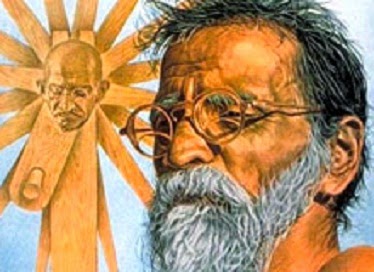 |
| Vinoba Bhave Image source: CulturalIndia |
Bhave wrote numerous books. Some of his books are— The essence of Quran, The essence of Christian teachings, Thoughts on education, Swarajya Sastra. There is a university named after him at Jharkhand— Vinoba Bhave University. A detailed biography of Bhave is available at Wikipedia, in this article you'll find Vinoba Bhave's quotes and comments on Swami Vivekananda.
Vinoba Bhave told—
①
Vivekananda not only made us conscious of our strength, he also pointed out our defects and drawbacks. ...India was then steeped in tamas (ignorance and unwisdom) and mistook weakness for non-attachment and peace. That is why Vivekananda went so far as to say that criminality was preferable to lethargy and indolence. He made people conscious of the tamasika state they were in, of the need to break out of it and stand erect so that they might realize in their own lives the power of the Vedanta. Speaking of those who enjoyed the luxury of studying philosophy and the scriptures in the smugness of their retired life, he said football-playing was better than that type of indulgence. Through a series of obiter dicta, he rehabilitated the prestige of India’s soul force and pointed out to the tamoguna (unwisdom) that had eclipsed her. He taught us : "The same Soul resides in each and all. If you are convinced of this, it is your duty to treat all as brothers and serve mankind." People were inclined to hold that, though all had equal right to the tattva-jnana (knowledge of the Spirit), the difference of high and low should be maintained in the day-today dealings and relations. Swamiji made us see the truth that tattva-jnàna, which had no place in our everyday relationship with our fellow beings, and in our activities was useless and inane. He, therefore, advised us to dedicate ourselves to the service of daridra-Narayana. (God manifested in the hungry, destitute millions) to their uplift and edification. The word daridra-Narayana was coined by Vivekananda and popularized by Gandhiji.1
②
... Indians had totally become slaves to the English people and considered themselves as inferiors. The entire world, as a result, began to look upon the Indians as substandard in all parameters. ... At this very juncture Vivekananda had stepped in, and reminded the Indians of their spiritual power. Influenced by materialism we had reached such a pit that a sense of overall degradation prevailed in every sphere of life. India was in a stupor with thoughts as if our sociology was bad, we knew nothing of politics, and, even, our religion was imperfect. But every country has its own speciality, its own power – and India was no exception to this. The only thing was we were unaware of it. ...When India was in such a state, Vivekananda went to America, and there he preached the message of Vedanta to the world. He also told everyone about India's supreme spiritual power. And his speech over there showered elixir throughout India. Indian people could find strength to stand with their head high. It was the consequence of Vivekananda's speech that the Indians were able to realize that they also had power and, moreover, their spirit would remain ever free even if the country were conquered by external force. The peoples of distant lands could furthermore learn about India's long historical ancestry and they realized that the distinctive power of the land is worth assimilation.2
References
- Prabuddha Bharata, May, 1963, pp. 172-73
- Speech originally delivered on 15 January 1955, Source: Vivekananda O Samakalin Bharatbarsha, Basu, Sankari Prasad, Vol.7, pp. 198–99
Do you like this article? Is this article easy to understand? Please post your feedback in the comment box below. Your feedback will help us to improve this website.
This page was last updated on: 5 April 2014, 10:58 pm IST (UTC+5:30 hours)
Number of revisions in this page: 1
No comments:
Post a Comment
Comment policy